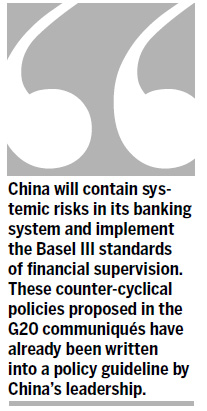Op-Ed Contributors
Rebuilding financial confidence
Updated: 2011-02-17 08:06
By Fu Jing (China Daily)
|
 |
G20 conference in Paris could offer direction to global reconstruction of monetary and risk-control mechanisms
This Friday and Saturday, the G20 finance ministers and central bank governors will convene in Paris focused on fixing the global economic system.
On Monday, French Finance Minister Christine Lagarde repeated that the overriding goal of the meeting was to create the conditions for "solid, balanced and sustainable growth" for the world economy.
This two-day meeting is designed to be a watershed for the world's financial system and China is expected by many to play a key pro-active role in reconstructing the global financial architecture.
After five summits since November 2008, as they shuttled back and forth to address the immediate effects of the global financial crisis, the world leaders finally decided that the financial crisis had eased enough that they could decrease the frequency of their meetings. This year the G20 leaders will meet only once in Cannes, France, in November.
Before that summit, the finance ministers and central bank governors are expected to define the economic indicators of global imbalance at this week's meeting and remodel the current US dollar-dominated international monetary system, both of which are regarded as root causes of the financial crisis during the previous two years.
Meanwhile, reducing the excessive volatility of raw materials, implementing seamless financial regulation and assisting development are the main goals of the French G20 presidency's agenda.
France wants not only trade and current account balances, but also growth differentials and the accumulation of foreign exchange reserves to be the indicators of global imbalances.
It is still not clear what kind of indicator system will finally be adopted to monitor the global economy, but if the indicators work as a reference system to guide an individual country's economic development, it is rational and acceptable. If the G20 is planning to churn out a set of binding indicators and ceilings to regulate individual economies, then it will in all probability be meaningless, as enforcement will be a huge problem.
Moreover, the world should not ease off taking more concrete rebalancing actions at a time when Europe is mired in a public debt crisis, the emerging economies are facing inflationary pressures and the United States is still experiencing difficulties with toxic assets and economic sluggishness.
Other economies should follow the examples of China and the US and set up plans and timetables to increase their exports or imports, speed up economic globalization and decrease global imbalances.
China recently pledged that it will further open up its economy by encouraging Chinese companies to invest overseas, increasing foreign purchases and doubling China's imports during the coming five years.
China's ambitious plan has been echoed by the US, which announced it intends to double its exports by 2014.
As to reform of the US dollar-dominant monetary system, France is proposing to extend the basket of currencies in the IMF's special drawing rights to include the yuan. When Chinese President Hu Jintao visited the US in January, the US agreed to support this move, but China has yet to draw up a timetable for its implementation.
However, China has already said it will contain systemic risks in its banking system and implement the Basel III standards of financial supervision. These counter-cyclical policies proposed in the G20 communiqus have already been written into a policy guideline by China's leadership. And most likely, the concepts will be turned into laws to safeguard China's financial and banking safety.
But it will take a collective effort at the meeting in Paris to achieve a global consensus on policies and actions that might help avert another global financial crisis.
The author is China Daily's chief correspondent in Brussels.
Specials

Spring Festival
The Spring Festival is the most important traditional festival for family reunions.

Top 10
A summary of the major events both inside and outside China.

A role model
Alimjan Halik had been selected as the "Cyberspace Personality Who Moved the Hearts of the Chinese in 2010".